ABSTRACT:
Only if you know your customers can you surpass their expectations. Building and sustaining successful customer relationships is challenging as it requires a detailed understanding of your customer’s buying journey, preferences, and behaviors. Implementing a Customer relationship management (CRM) system can help you engage with your customers via multiple channels and get to know them. Interestingly, CRM has evolved over the years, and today, we are experiencing the involvement of artificial intelligence (AI) in CRM. AI’s integration has modernized CRM.
GoodFirms compiled and circulated a questionnaire among its associated B2B companies. This survey study examines more about AI CRM, its applications in different industries, its benefits, breakthrough value for sales, marketing, and customer service, and how AI helps brands understand customers. Also, will we know what it takes for a business to transition from traditional CRM systems to AI-powered CRM software.
AI-powered CRM uses advanced technology to analyze data using machine language, predict the future, and help users make data-driven decisions. It enables businesses to know their customers, quickly see improved revenues, boost customer loyalty, gather new customers, and retain happy customers.
Businesses that are not implementing AI CRM and fail to rapidly improve their CRM activities will just fall behind.
Table of Contents:
- Do You Think Knowing AI Can Help Brands in Knowing their Customers?
- Do You Think Integrating Actionable AI Within The CRM Platform Can Help Brands Build Exceptional Customer Relationships?
- Benefits of AI-Powered CRM
- Role of AI CRM in Sales
- Role of AI CRM in Marketing
- Role of AI CRM in Customer Service
- Top Industries Leveraging AI-Powered CRM
4. How is AI going to transform the future of CRM?
5. Are There Any Drawbacks Of Combining AI-Powered Tools With CRM Systems?
6. What are the Challenges of AI CRM Implementation?
7. From 1-10 How Do You Rate AI’s Role In Fostering CRM
8. Survey Summary: Key Takeaways
Introduction - Managing Customers is More Critical than Ever
Customer relationship management or CRM is a prime activity of any organization. Companies that are able to deliver value to their customers are the ones that can derive value from the customers. 70% of the businesses are already using CRM.[1]
Several contextual factors contribute to the success and failure of a business. All in all, it sums up customer satisfaction. Today, more than the quality and value of offers that a company extends to its customers, there is an expectation that customers are offered personalized services, customized products & services, and preferential purchase options. Gaining customer satisfaction, and maintaining a better relationship with them contributes to better customer retention.
Evolving technologies like AI, machine learning, etc., enable businesses to instantly gather data, analyze, and deliver services better than ever before. Right from the demographics, consumers' clicks on the website, purchase history, feedback & reviews analysis, etc., will help businesses create highly customized offers at the right time, channel, and price. AI-based CRM software comprises features that can automate these activities and help companies deliver the next best offers, thereby enhancing customer relationships.
"The first rule of any technology used in a business is that automation applied to an efficient operation will magnify the efficiency. The second is that automation applied to an inefficient operation will magnify the inefficiency." - Bill Gates.
Efficient operation involves efficient understanding of the customers. Although managing customers is more critical than ever, managing customers is easier than ever with AI-powered CRM. AI in customer service is proving to be more beneficial both for customers and for the companies. Businesses of all sizes and types, regardless of the business model, specifically startups and small businesses can save time and avoid chaos by leveraging the benefits of AI CRM. AI helps right from identifying customers, attracting, retaining, and growing with the customers.
About the Survey:
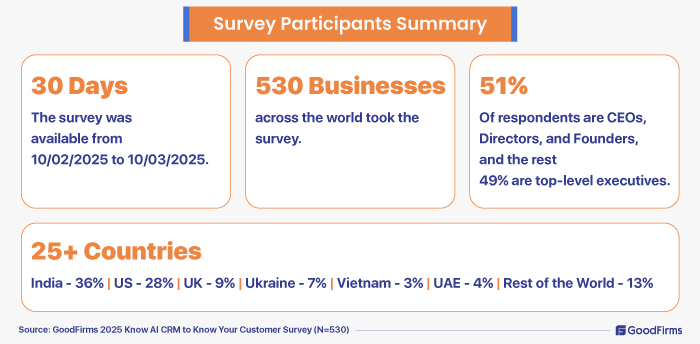
GoodFirms surveyed 530 businesses worldwide to discuss the benefits of AI in CRM, and the benefits of knowing AI CRM to know customers better in 2025. The survey was conducted for 30 days, made available from 10/02/2025 to 10/03/2025. 51% of respondents are CEOs, Directors, and Founders, and the rest 49% are top-level executives. The respondents are from 25+ countries including India - 36%, the United States - 28%, the UK - 9%, Ukraine - 7%, Vietnam - 3%, UAE - 4%, and the rest of the world - 13%.
AI CRM Survey Analysis:
“Knowing your customers will help craft your offerings based on the customers’ preferences.”
Every business must understand the role of AI in CRM to learn more about their customers and understand every engagement. As of March 2025, when the term “AI CRM” is searched via Google, the number of results generated is about 286,000,000. The demand to understand the value of artificial intelligence in customer relationship management is at an all-time high this year.
To help readers drive innovation and optimize the potential of AI with CRM, GoodFirms collaborated with its research partners to co-create this survey article and gather insights from the top CRM professions every step of the way.
GoodFirms initiated this survey with several valuable questions. The following sections will discuss the same.
Do You Think Knowing AI Can Help Brands in Knowing their Customers?
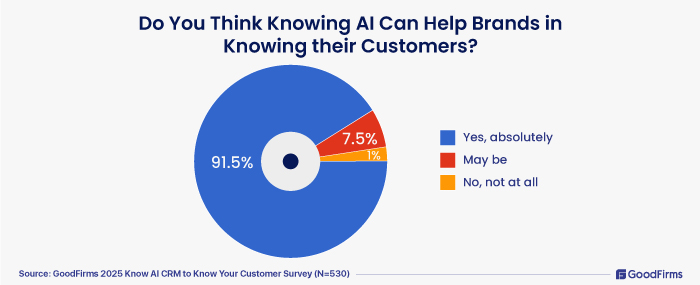
91.5% survey participants said AI can help brands in knowing the customers.
7.5% participants were not sure, and merely 1% felt knowing AI has nothing to do with knowing the customers.
To support this question, GoodFirms also attempted to check with the experts on whether integrating actionable AI within the CRM platform can help brands build exceptional customer relationships.
Do You Think Integrating Actionable AI Within the CRM Platform Can Help Brands Build Exceptional Customer Relationships?
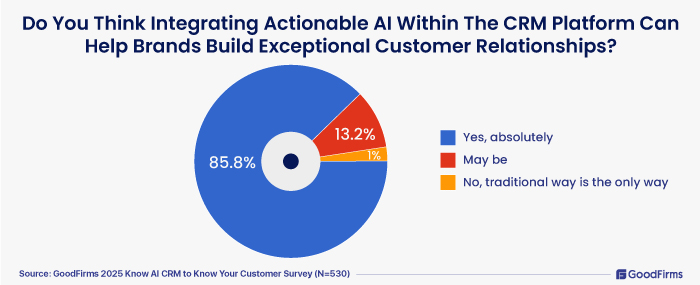
85.8% respondents agreed strongly that AI integration within the CRM can surely help brands build exceptional customer relationships. 13.2% participants were not too sure, and a mere 1% felt the traditional way as the only way.
The use of AI in CRM is growing and several top vendors have already integrated AI-features into their customer relationship management software. Here, GoodFirms attempted to gather more inputs from the survey participants on the benefits of AI-powered CRM.
Benefits of AI-Powered CRM Software
Here are the top benefits of AI powered Customer Relationship Management (CRM) systems. Do you have anything more to add to this list? If yes, then add your suggestions.
1) Anticipate customer needs
2) Forecast customer behavior
3) Maximize productivity
4) Deliver more impactful customer experiences in sales
5) Deliver more impactful customer service
6) Deliver more impactful customer care
#1 Anticipate Customer Needs
Businesses must know their customers, their buying history, their feedback, and their every interaction so that it gets easier to anticipate what and when they need their products/services. For businesses, any time spent knowing these details will help to serve them proactively. Thanks to AI CRM, the technology that can help brands to know their customers and their preferences better.
#2 Forecast Customer Behavior
Today, we live in an era of predictive intelligence [2], where brands can forecast what their customers would be interested in buying. For this, data collection, data processing, data analyzing, and leveraging data intelligence with the help of artificial intelligence, machine learning, and generative algorithms should be in practice. Leveraging customer relationship management powered by artificial intelligence enables brands to forecast, suggest, and personalize buying journeys effortlessly.
#3 Maximize Productivity
Efficiency in completing a task and all the workflows related to business operations is a bit overwhelming these days, considering the escalating demand from the customers and the need to maintain the speed and accuracy of every task. For this, the team must eliminate time-wasting tasks and utilize the time to conduct broad, productive tasks. Maximizing focus and mastering prioritization play a more significant role in maximizing productivity. “Companies can be more productive by focusing on what matters the most,” says the book: The ONE Thing: The Surprisingly Simple Truth About Extraordinary Results, by Gary Keller and Jay Papasan.[3] The authors clearly indicate that “You can have both ― less and more - cut through the clutter, achieve better results in less time, build momentum toward your goal, dial down the stress, overcome that overwhelmed feeling, revive your energy, stay on track, master what matters to you.” Today, we can achieve these with the help of AI backed CRM.
#4 Deliver More Impactful Customer Experiences in Sales
Businesses should first know their customers, listen to them, understand their requirements, customize offerings, ensure personalized communication, and offer seamless experiences to deliver a more impactful customer experience. Businesses should master collecting data, gathering insights, and tweaking their strategies as per the analyzed data. For every strategy that the company plans to implement, it is critical to ensure new or improved customer experiences.[4] Measuring the success of the experiences is also critical. AI-powered CRM comes of great use here to collect and analyze data, and to measure the success of the customer service.
#5 Deliver More Impactful Customer Service
AI-enabled customer service is the next frontier of customer engagement, says McKinsey.[5] Investment in an AI CRM for customer service can significantly transform the service quality by being proactive, delivering higher value, better satisfaction, and enhanced experiences to the customers.
#6 Deliver More Impactful Customer Care
The more a business cares about its customers, the better they remain loyal. Better loyalty means retention, better brand reputation, improved sales, and competitive advantage. As the business landscape competition is increasing day-by-day, those that deliver impactful customer care will have the chance to stand apart and ahead. Artificial intelligence (AI) has the capabilities to help brands improve customer care and efficiency in handling customers.
Precisely, AI CRM constitutes business growth. Interestingly, here are the factors impacting on-going adoption of AI in CRM, as quoted by the survey participants;
Automate repetitive tasks, gather real-time insights & analytics, hyper-personalized marketing, sentiment analysis, lead scoring & prioritization, optimized customer retention, seamless omnichannel experience, fraud detection & risk management, information & knowledge management, customer retention, boost customer engagement across channels, enhance data-driven decision-making, improve customer segmentation and targeting, AI-powered voice assistants, AI-driven pricing optimization, fraud detection & risk analysis.
“Enhance data-driven decision-making, improve customer segmentation and targeting, and automate routine tasks to free up time for strategic activities.” Kodansoft
“Improve Customer Retention Rate.” Maticz Technologies
“Personalized customer interactions and improved lead scoring & sales predictions.” Maxtra Technologies
“Time saving benefits.” NCSofttech
“Improve Lead Scoring & Qualification.” RW INFOTECH
“Get insights to improve business performance and process end to end.” StartxLabs Technologies Private Limited
Until recent years, and just before AI started gaining popularity, businesses used CRM software to conduct various sales-related activities. The tool showcased features like calendar & task, custom dashboard, contact management, email integration, analytics, and reporting, and helped users manage leads, files, pipelines, workflows, security, and much more. But, post-AI, the tool has gained more popularity due to its ability to automate workflows, provide real-time insights, deliver predictive analytics, personalize services, allowing brands to have a meaningful relationship with their customers.
GoodFirms, through this survey, gathered a few valuable insights from top CRM professionals on the role of AI CRM in sales, AI CRM in marketing, and AI CRM in customer support. Here is the analysis of the same;
Role of AI CRM in Sales
An AI-powered CRM can help the sales team with the often hidden strategies to unlock the next sales lead. Artificial intelligence is one of the best technologies available today that can guide businesses, especially the sales team, to evolve with the emerging customer requirements and the business objective. It has the potential to deliver value to both customers and the company. Several businesses today recognize the pivotal role of AI CRM in sales. The benefits quoted by many in the industry are the refined sales processes, perfected sales chains, and efficient sales closing with sustainable growth. Companies experience 30% increased revenue by implementing AI Sales CRM. [6] Here, GoodFirms gathered valuable inputs from top experts on the role of AI CRM in sales. Here are the results of the same;
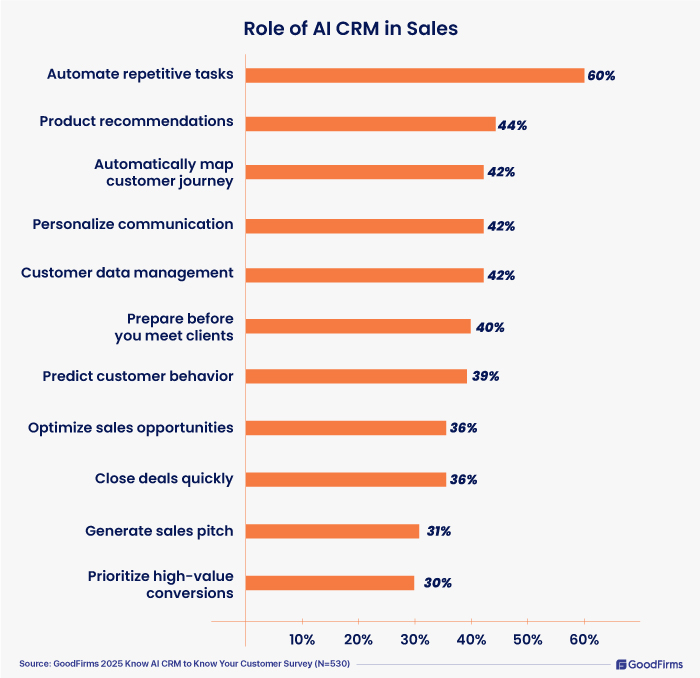
#1 Automate Repetitive Tasks
60% of the survey-participated CRM experts mentioned that AI CRM can help in automating repetitive tasks, enabling them to focus on more productive tasks.
#2 Product Recommendations
44% survey respondents believe that AI-driven CRM Solutions help in product recommendations based on the customer data analytics, and algorithms. Gathering customer insights, enabling data-driven decisions, predictive analytics, customer segmentation, etc., with the help of AI can help brands recommend products, and customize their offerings.
#3 Automatically Map Customer Journey
42% participants vouched that CRM with AI has the capability to automatically map customer journeys. Mapping customers journey can help in customer retention and in delivering proactive recommendations contributing to personalized services.
#4 Personalize Communication
42% of the CRM professionals who participated in this survey said that AI CRM when implemented for sales activities can help in analyzing customer data and personalizing communication as per the history. Personalized communication enhances customer satisfaction and retention.
#5 Customer Data Management
42% of CRM experts who participated in this survey felt AI CRM was most effective for customer data management. Validating customer data, profiling, segmenting, securing, integrating the data with systems, and applying the algorithms to proactively allow brands to serve their customers are the key functions of AI when combined with customer relationship management software.
#6 Prepare Before you Meet Clients
40% of survey respondents said AI-powered CRM is most valuable for the sales team in preparing for client meetings. Engaging with clients in a relevant manner involves thorough research about them, their requirements, their past purchase history, and their demographics. Artificial intelligence enables the sales team to prepare effectively for this.
#7 Predict Customer Behavior
39% quoted AI CRM as useful for predicting customer behavior. The tool analyzes data with machine learning and enables the sales team to deliver what the customer prefers. Predicting what customers want much ahead of time helps improve personalization.
#8 Optimize Sales Opportunities
36% mentioned that AI-powered customer relationship management tools will help the sales team understand their customers, use data-driven insights to streamline sales processes, automate repetitive tasks, and customize offerings, eventually enhancing sales opportunities.
#9 Close Deals Quickly
36% of the survey respondents said artificial intelligence-integrated CRM would help the sales team to close deals quickly.
#10 Generate Sales Pitch
31% of participants noted that AI can help generate exceptional sales pitches, which can create a positive impact and help close deals without any friction.
#11 Prioritize High-value Conversions
30% of the surveyed CRM experts think that AI CRM can help the sales team optimize the sales process, strategize based on the data analysis, focus on high-potential leads, nurture the leads, and take time to focus on high-value conversions.
Role of AI CRM in Marketing
Customer relationship management solutions packed with AI features facilitate the potential to analyze data in real-time, contributing towards smart marketing. The marketing team can personalize campaigns, create customized services, and boost customer engagement by automating data segmentation and harnessing insights. This increases conversion rates. GoodFirms in this survey was also eager to know what the experts thought about AI’s role in marketing CRM.
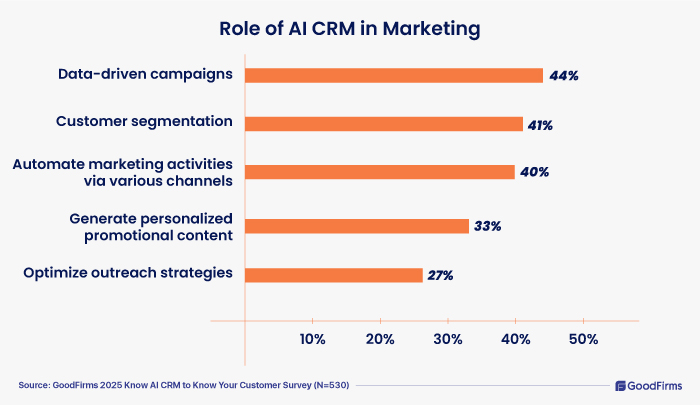
44% of the CRM experts who participated in this survey felt AI CRM helps in data-driven campaigns. Gathering information regarding customer preferences, behaviors, and intentions can help generate personalized campaigns that are sure to resonate with the customers.
41% said customer segmentation. Any miss-aligned segmentation of the customer data can affect revenue, and customer churn. AI-backed strategies to segment customers can improve personalization, and increase the chances of sales success.
40% of the participants said the role of AI CRM in marketing is to automate marketing activities via various channels. Repetitive tasks in marketing consume a lot of time and resources. To smartly carry out the marketing activities, businesses can invest in artificial intelligence-backed customer relationship management software that can handle repetitive tasks without the intervention of human workforce.
33% favored personalized promotional content generation, and 27% said the tool could help the marketing team optimize outreach strategies. By harnessing the power of artificial intelligence CRM, the marketing team can optimize and creatively generate personalized content across various channels.
Role of AI CRM in Customer Service
AI-backed customer relationship management software is packed with analytics and algorithms-based features, enabling businesses to leverage them as intelligent assistants in handling several customer service processes. AI plays a more significant role in analyzing customer data, personalizing support, providing fast and efficient support, quickly handling queries, prioritizing ticketing, resolving issues, and assisting customers virtually from anywhere.
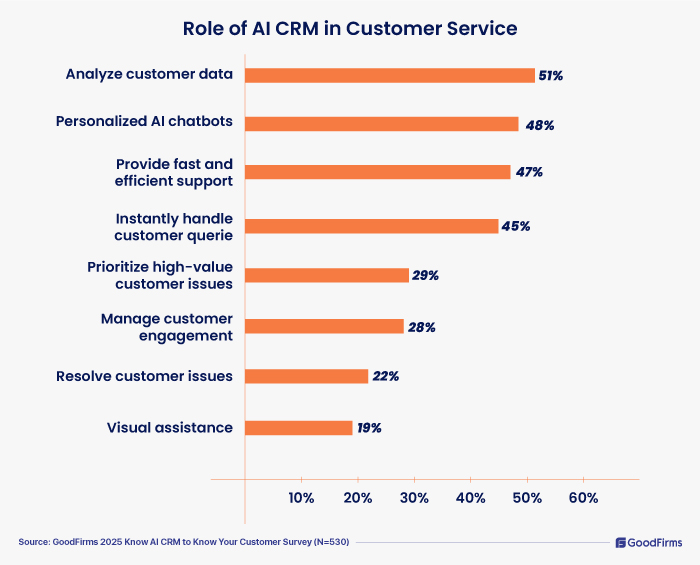
Forecasting outcomes based on customer data, customer buying history, every interaction, and every touch point that the customer has with a brand is one of the best ways to offer exceptional customer service. Artificial intelligence enables the customer service team to be proactive, with predictive intelligence gathered via the AI CRM tool. 51% of the survey participants mentioned that AI-powered customer relationship management solutions allow businesses to analyze customer data.
48% of the survey-participated CRM professionals felt AI CRM tools can help personalize customer services through AI-driven chatbots. Such an application uses conversational AI techniques and machine learning techniques, including natural language processing (NLP), to understand and communicate more reasonably and effectively, similar to human service agents. Every interaction is processed based on the data analyzed.
47% participants indicated that AI CRM will help the customer service team provide fast and efficient support. Resolving queries promptly, and efficiently is one of the top-most demands from the customer service team of any business. AI algorithms enable the service team to proactively resolve queries. Automated query resolution is another major feature of AI CRM.
45% felt that AI-powered CRM can help the customer service team handle customer queries instantly. This is achieved based on knowledge gathered via predictive analytics, a thorough understanding of the customer buying history, and a strong customer relationship. Gartner predicts that agentic AI will resolve 80% of common customer service issues without human intervention by 2029.[7]
29% of the survey respondents said the tool, with AI assistance, can help the service team to prioritize high-value customer issues.
28% believed that artificial intelligence-backed CRM can help service agents to manage customer engagement efficiently. 22% said AI can help resolve customer issues, and 19% said AI can act as Visual assistance.
Top Industries Leveraging AI-Powered CRM
Which Industry According To You Significantly Needs AI CRM?
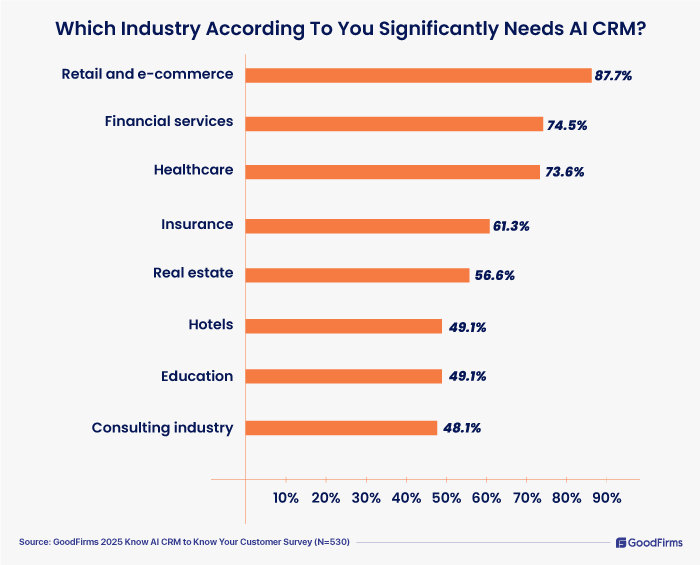
According to 87.7% of survey participants, the retail and ecommerce industry is in the top position as the top user of AI-backed CRM solutions. Retail and e-commerce businesses are the most users as it is critical for them to follow their customers closely, conduct their operations aligning with their customers’ requirements, customize offerings, personalize experiences, improve customer experiences, and efficiently manage business operations. AI-powered CRM will help them with algorithms, data analysis, and predictive analytics and enable task automation.
74.5% of respondents ranked the financial services industry as the second-leading user of AI CRM (Customer Relationship Management) tools. The need to conduct risk-free automated transactions, reimagine customer engagement, deliver customized experiences, improve loyalty, lower costs, and gain customer satisfaction are the top factors driving financial services companies' adoption of CRM with AI.
73.6% of survey respondents felt Healthcare was the third top user of AI CRM software to improve patient care, enhance day-to-day operations, efficiently handle patient-doctor interactions, prioritize appointments according to need, lower cost, and proactively deliver exceptional services.
The Insurance industry is fourth in the use of CRM with AI to conduct its day-to-day operations with data-driven insights. 61.3% of survey participants voted for this industry. The tool can help insurance companies automate repetitive tasks, analyze data, be predictive, and offer improved customer services.
56.6% opted for the Real estate industry. Artificial intelligence technology-backed CRM for real estate companies enables them to leverage algorithms, predict market trends, proactively deliver customer service, stay competitive, and automate day-to-day operations.
49.1% of the survey participants identified the hotel industry as the most user of AI-powered customer relationship management tools. The top reasons the hotel industry requires AI CRM are enhanced marketing strategies, dynamic pricing, operational efficiencies, data management, personalized services, customized interactions, and predictive data analytics.
The education industry also gained 49.1% vote for being the top user of AI-backed CRM. The benefits of using this tool includes; optimized student in-take operations, improved student engagement, personalized learning, student data analysis, efficient management of both student and faculty.
48.1% opted for the Consulting industry due to the fact that AI CRM has the potential to enable them to automate tasks, leverage data-based strategies, and address the modern business requirements. “Investing in advancing next-generation technology, and leveraging them is the key for management consultants to build trust with their clients.” [8]
The Power of Artificial Intelligence (AI) CRM
The power of artificial intelligence customer relationship management software is undeniable. GoodFirms attempted to gather insights from this survey participants on prime three frequently asked questions: How is AI going to transform the future of CRM, the drawbacks of combining AI-powered tools with existing CRM software, and the challenges in implementing in AI CRM. GoodFirms’ goal in this compendium is to give the readers of this article, and the CRM users an end-to-end view of an AI CRM’s full stack capabilities and throw light on how these capabilities cut across customer engagement, decision making, predictive analysis, and automated operating model. Here are the study results;
-
How is AI going to transform the future of CRM?
“AI is set to revolutionize CRM, transforming it from a static repository of data into a dynamic, predictive, and proactive business tool. In the future, these systems will provide more in-depth customer insights, automate routine tasks, and enable more strategic decisions. It could improve every aspect of customer relationship management, from prospect lead scoring and sales forecasting, customer service, and retention strategies. By leveraging distinct AI technologies, CRMs could also deliver more impactful customer experiences, improve operational efficiencies, and drive revenue growth.” Brave River Solutions
“AI will transform CRM by enhancing lead scoring, sales forecasting, and marketing automation with smarter insights and recommendations. AI will streamline workflows, improve decision-making with actionable data, and analyze customer sentiments for more tailored interactions. Overall, AI will boost efficiency, customer satisfaction, and business performance by delivering more relevant, timely, and proactive solutions to customers.” ByteQuest Software
“It will automate administrative tasks and help offer personalized customer support. You would know more about the customer than you did before, allowing you to make offers and packages with a higher chance of conversion.” FuturByte
“AI will unify customer interactions across email, phone, chat, social media, and in-person interactions.” GNX
“Enhanced customer support, improved sales insights, personalized customer experience.” Maneksoft
“It will allow reps to more easily read and write information, prepare collateral, and engage customers in a more personalized manner.” Multimodal
“The future of AI in CRM likely lies in deeper automation, predictive analytics, real-time personalization, and more advanced natural language processing, among other developments.” Olivet Cloud Solutions Nigeria Limited
“AI will make CRM systems more intelligent, proactive, and customer-centric. Instead of merely storing customer data, future CRM platforms will analyze, predict, and act to improve engagement, retention, and sales performance.” Satva Solutions
“It will automate each module. You don’t need to hire many human resource workers to manage CRM queries and data.” TechnoLyte
-
Are There Any Drawbacks Of Combining AI-Powered Tools With CRM Systems?
While AI CRM offers numerous benefits, there is no denying that it comes without any drawbacks. Here are a few inputs from the survey participants on the drawbacks of combining AI with CRM system;
“There are some notable drawbacks to integration between AI and CRM systems:
- Data privacy and security risks from handling sensitive customer information
- Risk of over-automation leading to impersonal customer experiences
- Potential data quality issues affecting AI accuracy
- Need for extensive staff training and change management
- High implementation and maintenance costs
- Integration challenges with legacy systems”AgileTech Vietnam
“Yes, some drawbacks include data privacy concerns, potential biases in AI models, and over-reliance on automation, which may reduce human touch in customer interactions. For example, AI-generated responses can sometimes lack empathy, leading to customer dissatisfaction.” Exaud
“Yes, there are some considerations. AI-powered CRMs rely on large datasets, which raises data privacy and security challenges. Poor-quality or biased data can lead to skewed insights and discriminatory outcomes. Integration with legacy systems may be complex, and excessive automation risks diminishing the valuable human touch in customer interactions. However, these issues can be managed through strong governance, regular audits, and a balanced approach that combines AI efficiency with human expertise.” Krish TechnoLabs
“Yes, the team will be lazy and can input incorrect prompts which can lead to losing the customer.” Popaya Technologies LLP
“Relying only on what AI suggests, without spending time thinking if things make sense or have value for the customer and business.” Pwrteams
“While AI can supercharge a CRM’s capabilities, there are a few pitfalls to watch out for. First, these tools rely heavily on large amounts of accurate data, and if the data is incomplete or biased, the AI’s insights can be misleading. Second, privacy concerns become more pronounced as sensitive customer information is processed by algorithms, so robust security measures are essential. Then there’s the risk of over-automation—if everything’s automated, customers might miss the personal touch they expect. Finally, integrating AI-driven solutions can get costly and technically complex, especially for smaller organizations that may not have the resources or expertise to manage it effectively.” Solulab
-
What are the Challenges of AI CRM Implementation?
Although CRM software integrated with AI features have huge potential, there are a few challenges that are faced by businesses. This is commonly found with AI CRM for small businesses. GoodFirms in this survey attempted to check with its survey participants about the challenges that they come across during AI CRM implementation. Here are a few responses;
“Learning new and more effective solutions.”360 Marketing
“Time and staff education.” Cleveroad
“Challenges of AI CRM implementation include data quality issues, integration complexities with existing systems, high initial costs, employee resistance to change, and the need for ongoing maintenance and updates to ensure accuracy and effectiveness.” Decipher Zone Technologies Pvt Ltd
“Implementing AI in CRM systems presents several challenges. Data privacy and security are major concerns. Integration with existing systems can be complex. High implementation costs may be a barrier. Additionally, user adoption and training can be challenging, as employees may resist automation due to fear of job displacement. Regular updates, proper training, and ethical AI use are essential to overcoming these challenges and ensuring AI-driven CRM success.” Promatics Technologies Pvt Ltd
From 1-10 How Do You Rate AI’s Role In Fostering CRM
Integrating artificial intelligence (AI) with customer relationship management (CRM) is evident. This is currently a significant trend. When questioned, how do the participants rate AI CRM’s potential from 1-10, a notable 19.8% of businesses gave a 10-star rating. Nearly 30% gave 9-star ratings, 27.4% gave 8 ratings, 13.2% rated 7, 4.7% gave 6 and 5-star ratings. The average rating is notably 8.33.
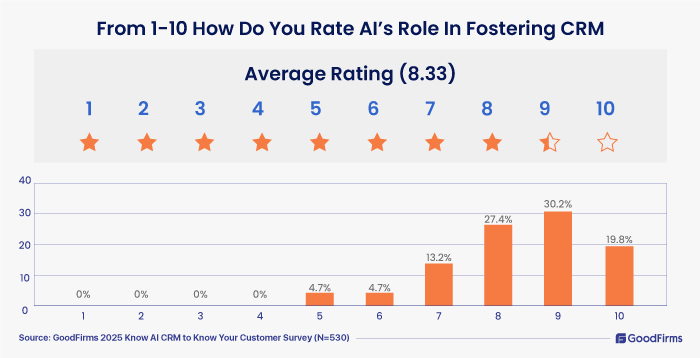
Average rating (8.33)
- 10 - 19.8%
- 9 - 30.2%
- 8 - 27.4%
- 7 - 13.2%
- 6 - 4.7%
- 5 - 4.7%
Survey Summary: Key Takeaways:
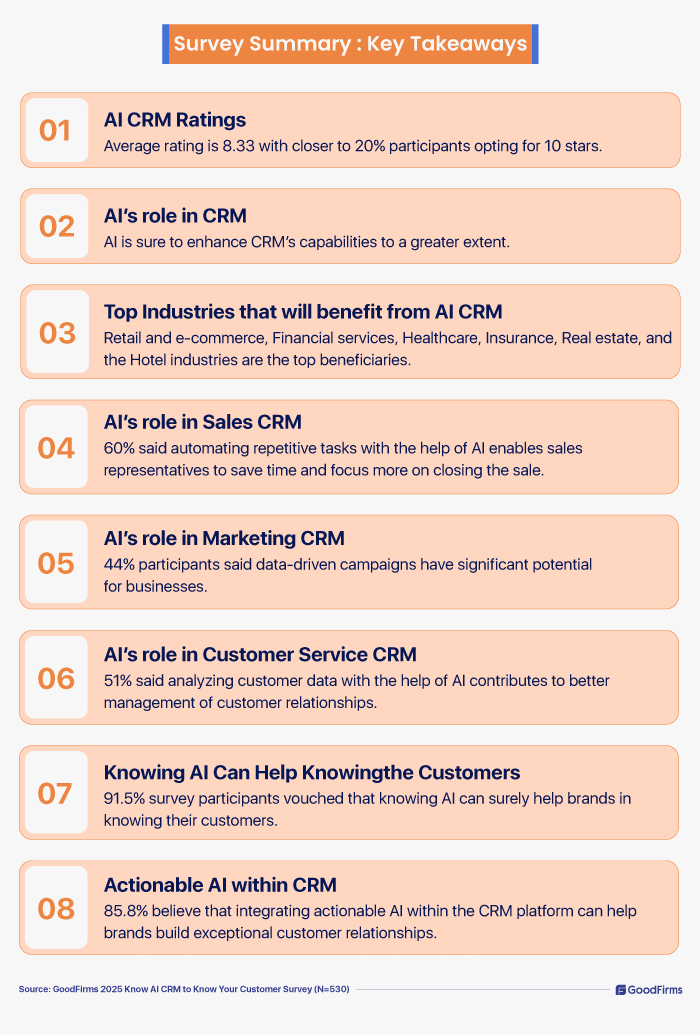
Key Findings:
- 01
AI CRM Ratings
Average rating is 8.33 with closer to 20% participants opting for 10 stars. - 02
AI’s role in CRM
AI is sure to enhance CRM’s capabilities to a greater extent. - 03
Top Industries that will benefit from AI CRM
Retail and e-commerce, Financial services, Healthcare, Insurance, Real estate, and the Hotel industries are the top beneficiaries. - 04
AI’s role in Sales CRM
60% said automating repetitive tasks with the help of AI enables sales representatives to save time and focus more on closing the sale. - 05
AI’s role in Marketing CRM
44% participants said data-driven campaigns have significant potential for businesses. - 06
AI’s role in Customer Service CRM
51% said analyzing customer data with the help of AI contributes to better management of customer relationships. - 07
Knowing AI Can Help Knowing the Customers
91.5% survey participants vouched that knowing AI can surely help brands in knowing their customers. - 08
Actionable AI within CRM
85.8% believe that integrating actionable AI within the CRM platform can help brands build exceptional customer relationships.
Conclusion - Why is AI the Future of CRM?
Artificial intelligence is already an established technology across the industries.
Currently, the technology is widely tested by integrating with CRM. Businesses are exploring generative AI, large language models, and other AI models to further enhance customer experiences and augment business operations. According to GoodFirms, there are nearly 500 top CRM vendors globally, and the revenue for the Customer Relationship Management Software market is indicated to touch US$145.61bn by 2029.[9] AI-driven CRM providers are gaining more traction as this combo application has the potential to foster customer relationships and optimize business growth. Knowing AI CRM helps businesses know their customers.
This research findings has clearly shed light on the pivotal role of AI in CRM. The survey points out how predictive, and generative AI transforms CRM’s role. Those businesses that leverage AI will grow and scale quickly. Tips shared by the CRM professionals here in this survey are valuable. We sincerely thank our research partners for their participation and opinions.
References:
- https://www.forrester.com/blogs/capitalize-on-a-crm-strategy-that-leverages-top-emerging-technologies/
- https://www.ibm.com/think/topics/predictive-ai
- https://www.google.co.in/books/edition/The_ONE_Thing/rB2ZDQAAQBAJ?hl=en&gbpv=0
- https://professional.dce.harvard.edu/blog/how-to-create-positive-customer-experiences-for-your-business
- https://www.mckinsey.com/capabilities/operations/our-insights/the-next-frontier-of-customer-engagement-ai-enabled-customer-service
- https://www.salesforce.com/crm/ai-crm/
- https://www.gartner.com/en/newsroom/press-releases/2025-03-05-gartner-predicts-agentic-ai-will-autonomously-resolve-80-percent-of-common-customer-service-issues-without-human-intervention-by-20290
- https://www.affinity.co/blog/management-consultants-crm
- https://www.statista.com/outlook/tmo/software/enterprise-software/customer-relationship-management-software/worldwide




